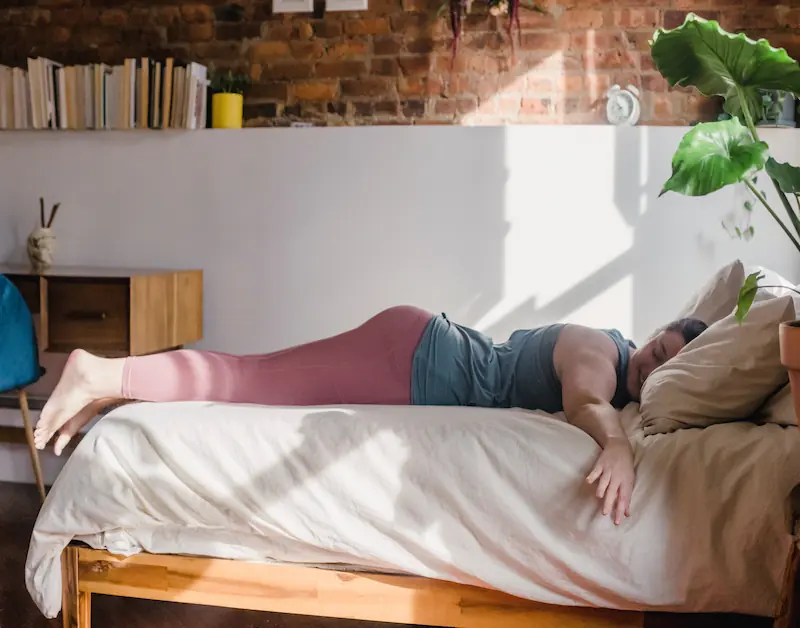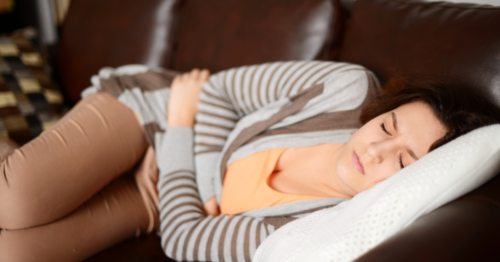
Table of Contents
Rest Well: Sleep Deprivation & Mental Health in Young People

Written By: Sarah Hinson (she/her)

Clinically Reviewed By: Dr. Jaime Ballard
September 12, 2022
6 min.
Learn more about the critical role sleep plays in maintaining balanced mental health, especially for teens and young adults.
Learn more about our Clinical Review Process
Table of Contents
Getting enough sleep can be tough for anyone, but is especially difficult for today’s adolescents and teens. And while it may be tempting for parents to wake them up when they’re sleeping in on a Saturday, you might want to let them sleep a little longer.
Why? Most of today’s youth are sleep-deprived. They’re also experiencing an alarming mental health crisis, with more than 4 in 10 teens reporting persistent feelings of sadness or hopelessness, and 1 in 5 reporting suicidal ideation.
While causes vary, sleep deprivation is one mental health factor we can, and should, address more frequently. Once we help adolescents and teens prioritize sleep, we can offer better support to those struggling with their mental health—whether sleep issues are a symptom, a contributing factor, or both.
Why is sleep so important?
The benefits of a good night’s sleep are myriad: optimal brain performance, enhanced mood, improved physical and emotional health. Sleep helps the body stay healthy and stay healthy.. Without enough sleep, our brains can’t function properly. Sleep deprivation can impair our ability to concentrate, think clearly, and process memories.
According to the National Sleep Foundation guidelines, adults require 7-9 hours of sleep each night. Children and teens need substantially more, with ages 6-13 requiring 9-11 hours and ages 14-17 needing between 8 and 10.
Our brain activity fluctuates during sleep, increasing and decreasing during different stages. Each stage plays a role in overall brain health, promoting better thinking, learning, and memory. Sufficient sleep, especially REM sleep (i.e. “rapid eye movement” sleep, when dreams are most vivid), helps our brain process emotional information.
Sleep is closely connected to our mental and emotional health. Studies show links between sleep and conditions such as depression, anxiety, and bipolar disorder. When we don’t get adequate sleep, we have a harder time consolidating positive emotional experiences from our day. We’re more likely to experience mood shifts and emotional reactivity or worsened mental health, including a higher risk of suicidal ideation or behavior.
Ultimately, the relationship between sleep and mental health is “bidirectional,” meaning that while mental health issues can make it more difficult to sleep, poor sleep—or sleep disorders like insomnia—can exacerbate mental health issues. In other words, sleeping problems may be both the cause and effect of mental health issues.
While it may require more time and resources to discern the exact origin of sleep issues among adolescents and teens, sleep deprivation remains a growing concern. It’s important for adolescents, teens, and adults to be informed about the consequences of sleep deprivation, as well as the steps we can take to prioritize rest.
Sleep deprivation among teens
Much like youth mental health has become a crisis, sleep deprivation has become an epidemic, particularly among teens. One CDC study found that 73% of high school students are not getting a healthy amount of sleep. The average highschooler sleeps 6 ½ hours per night (remember, the ideal number for teens is between 8 and 10), and 1 in 5 teens sleep 5 or fewer hours. Many are living in a state of chronic “sleep debt,” contending with the cumulative effect of not getting enough sleep.
As mentioned earlier, it can be hard to get enough sleep on a regular basis. Especially for teens. When it comes to sleep deprivation, some contributing factors include:
- Biology—really. Teens have a biological tendency to go to bed later and even experience a shift in the system governing their natural sleep-wake cycle. For older teens, the signal to sleep builds more slowly throughout the day, allowing them to stay more alert during the evening.
- Screen time. The advent of technology has had a profound impact on nearly every aspect of our lives. Adolescents and teens are tapped into addictive technologies, from games to social media apps. Scrolling before bed can significantly delay sleep. In fact, blue light from screens sends a message— “It’s not night time yet!” —via the retina to the portion of our brain that controls our circadian clock (i.e. the internal process that regulates our sleep-wake cycle).
- Pressure to perform. Adolescents and teens may feel the need to meet unrealistic expectations based on what they see/hear from peers or consume on social media. They might also worry about academic success and compare themselves to their classmates. Meanwhile, their mental, physical, and emotional health take a hit.
Tackling poor sleep early on may help reduce the likelihood of mental health issues surfacing or becoming worse. A 2020 study found that teens who reported sleeping badly at age 15, but were not experiencing depression or anxiety, were more likely than their peers to struggle with mental health issues at age 17, 21, or 24.
Why is there such a strong connection between sleep and mental health? It all goes back to the brain. Sleep deprivation activates the part of the brain most closely connected to depression, anxiety, and other mental health conditions. Without adequate sleep, the amygdala—commonly associated with emotional processes (think fight-or-flight response)—goes into overdrive. The prefrontal cortex shuts down, preventing the release of chemicals needed to calm down that fight-or-flight reflex.
Along with mental health issues, a sleep deficit can result in everything from poor concentration and suffering grades to more driving accidents. It’s up to parents, health professionals, school staff members, and other adults to educate adolescents and teens about the importance of sleep. With more knowledge and behavioral changes, we can help young people live healthier, happier lives—fully present, awake, and aware.

How to encourage better sleep
The Sleep Foundation offers tips for practicing and maintaining healthy sleep habits. Parents and professionals can also do their part to make an impact. Here are some ways we can promote better sleep for adolescents and teens:
- Start school later. The CDC has encouraged schools to adjust their start time in order to allow for more sleep, since most adolescents in the U.S. start school too early. Of course, this solution will take time, but it’s certainly possible.
- Ensure adolescents and teens get enough natural light during the day. Mornings are a perfect time to spend some time outdoors, weather permitting.
- Avoid caffeine in the evening. Caffeine can make it more difficult to fall asleep and reduce the amount of deep sleep you experience.
- Wind down before bed. Practice gentle breathing and progressive muscle relaxation. Learn how here.
- Maintain a regular bedtime. Parents, encourage children to get to bed at the same time each night, even on weekends. This will improve their circadian rhythm and overall sleep quality.
- Keep bedrooms cool, dark, and quiet. A media and device curfew is key. Adolescents and teens (and adults, too) should avoid looking at screens before bed.
- Healthcare professionals: Educate young patients and their parents about the importance of good sleep hygiene.
- Cognitive behavioral therapy, or CBT, may also help. It’s one of the modalities we use in our own virtual Intensive Outpatient Program at Charlie Health.
Healthy sleep is achievable with help
The connection between sleep and mental health is complex, but improving sleep is a step in the right direction. Parents can further encourage children to adopt healthier habits by setting an example. School administrators and staff members can speak up about the need for later start times. And healthcare professionals can stay informed while sharing knowledge and tips with patients.
Every individual has different needs, struggles, and capabilities when it comes to sleep and mental health. When dealing with sleep issues—and mental health issues in general—we encourage you to work with trained health professionals.
Whether you’re a parent searching for solutions or a teen struggling with sleep issues, help is available. Contact us today to learn about our mental health services for adolescents, teens, and families.





